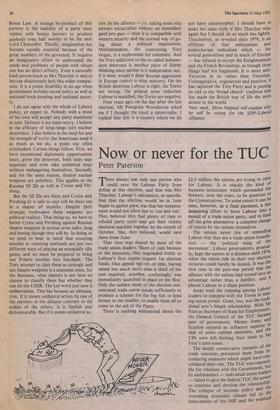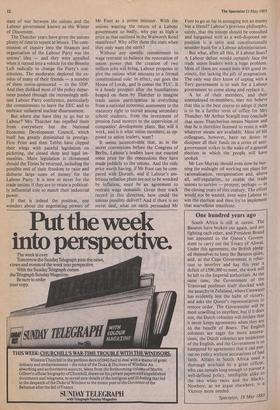Now or never for the TUC
Peter Paterson
There always was only one person who could save the Labour Party from defeat at this election, and that was Mrs Thatcher. Labour's calculation, as specula- tion that the election would be in June began to gather pace, was that her tempera- ment would not allow her to 'cut and run'. They believed they had plenty of time to rebuild party unity and get their rickety electoral machine together by the month of October. She, they believed, would save them from June.
That view was shared by most of the trade union leaders. Short of cash because of the recession, they responded feebly to Labour's first urgent request for election funds. One appeal ran out of time, having raised not much more than a third of the sum required. Another, confusingly, was immediately launched in place of the first. Only the sudden onset of the election con- centrated trade union minds sufficiently to produce a scheme for the big fish to lend money to the smaller, to enable them all to come to the aid of the Party.
There is nothing sentimental about the £2.5 million the unions are trying to raise forLabour. It is exactly the kind of business investment which persuaded the brewers, over the years, to be generous to the Conservatives. To some extent it can be seen, however, as a final payment, a last despairing effort to force Labour into a mould of a trade union party, and to fend off the grim alternative: a complete change of course by the unions themselves.
The unions never tire of reminding Labour that they are a trade union founda- tion — the 'political wing of the movement'. Labour governments, general- ly, kept the unions at a distance until 1974, when the union role in their two election victories could hardly be denied. It was the first time in the post-war period that the alliance with the unions had turned into an I advantage rather than a liability, and t placed Labour in a client position. Away went the yearning among Labour leaders to compete with the Tories in tam: ing union power. Gone, too, was the tradi- tional arm's length relationship. With Mr Foot as Secretary of State for Employment' the General Council of the TUC became part of government. Messrs Jones and Scanlon enjoyed an influence superior to that of some cabinet ministers, and the CBI were left kicking their heels in Mr Foot's ante-room. The deeply conservative instincts of the trade unionists prevented them from in- troducing measures which might have con- solidated their role. The TUC was responsi- ble for relations with the Government, but its ambassadors — individual union leaders failed to give the federal TUC the power to continue and develop the relationship. The collapse of incomes policy and the worsening economic climate led to the intervention of the IMF and the eventual
state of war between the unions and the Labour government known as the Winter of Discontent.
The Thatcher years have given the unions plenty of time to repent at leisure. The com- mission of inquiry into the finances and organisation of the Labour Party was the unions' idea — and they were appalled when it turned into a vehicle for the Bennite Left radically to change the Party's con- stitution. The moderates deplored the ex- odus of many of their friends — a number of them union-sponsored — to the SDP. And they disliked most of the policy depar- tures pushed through the increasingly mili- tant Labour Party conference, particularly the commitments to leave the EEC and to embrace unilateral nuclear disarmament.
But where else have they to go but to Labour? Mrs Thatcher has expelled them from everywhere but the National Economic Development Council, which itself has greatly diminished in prestige. First Prior and then Tebbit have clipped their wings with painful legislation on picketing, the closed shop and legal im- munities. More legislation is threatened should the Tories be returned, including the possible end of their freedom to raise and disburse large sums of money for the Labour Party. It is now or never for the trade unions if they are to retain a political- ly influential role to match their industrial power.
If that is indeed the position, one wonders about the negotiating powers of Mr Foot as a prime minister. With the unions wanting the return of a Labour government so badly, why pay as high a price as that outlined in the Walworth Road manifesto? Why offer them the stars when they only want the earth?
Without any specific commitment to wage restraint to balance the restoration of union power that the creation of two million jobs will bring, Labour proposes to give the unions what amounts to a formal constitutional role: in effect, out goes the House of Lords, and in comes the TUC. It is a heady prospect after the humiliations heaped on them by Thatcher to imagine trade union participation in everything from a national economic assessment to the statutory right to recruit among secondary school students, from the investment of pension fund moneys to the supervision of companies' development plans. But will it work, and is it what union members, as op- posed to union leaders, want?
It seems inconceivable that, as in the secret conventions before the Congress of Berlin, Labour's leaders have not exacted some price for the concessions they have made publicly to the unions. And the only price worth having, if Mr Foot can be com- pared with Disraeli, and if Labour's am- bitious reflation plans are not to be wrecked by inflation, must be an agreement to restrain wage demands. Given their track record in this direction, how could the unions possibly deliver? And if there is no secret deal, what on earth persuaded Mr Foot to go so far in assuaging not an enemy but a friend? Labour's previous philisophy, surely, that the unions should be consulted and bargained with as a well-disposed op- position is a safer and constitutionally sounder basis for a Labour administration.
But what, after all this, if Labour loses? A Labour defeat would certainly face the trade union leaders with a huge problem. Most of them are sound men with good in- stincts, but lacking the gift of pragmatism. The only way they know of coping with a Tory government is to wait for a Labour government to come along and replace it.
A lot of their members, and their unemployed ex-members, may not believe that this is the best course to adopt if there is to be a further term of office for Mrs Thatcher. Mr Arthur Scargill may conclude that more Thatcherism means Nazism and that he is therefore licensed to resist it with whatever means are available. Most of his colleagues, however, have no desire to dissipate all their funds on a series of anti- government strikes in the wake of a general election in which the people will have spoken.
Mr Len Murray should even now be bur- ning the midnight oil working out plans for rationalisation, reorganisation and, above all, self-regulation, to enable the trade unions to survive — prosper, perhaps — in the closing years of this century. The effort would not be wasted, even were Labour to win the election and then try to implement that marvellous manifesto.











































 Previous page
Previous page